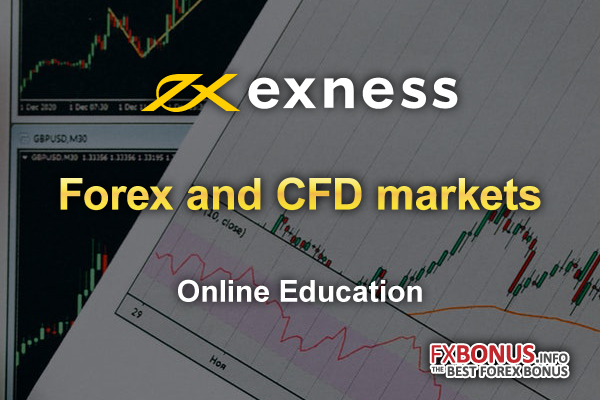What's the difference between Forex and CFD markets? Table of Contents

An online broker Exness offers 2 types of financial markets for trading which are Forex and CFDs.
It is a great thing that you have an option to diversify your portfolio flexibly with various markets though, do you know the difference between Forex and CFD markets exactly?
In this article, we will get into more details and find out more about Forex and CFD products.
What is Forex?
Forex (foreign exchange or FX) is, in simple terms, the largest financial market in the world where individuals, companies and financial institutions can exchange global currencies at changing rates.
The forex market is the largest market in the world with an average daily trading volume of over $ 5 trillion.
The decentralized foreign exchange market is open 24 hours a day from Sunday evening to Friday evening, with a wide range of currencies traded at any time by traders who want to take advantage of price fluctuations.
There are hundreds of currency pairs that can be traded.
The most traded pairs are known as “majors”.
The majors are made up of the following currencies: US dollars, British pounds, euros, Japanese yen, Canadian dollars, Swiss francs and Australian dollars.
The other currencies are known as “Minors” and include currencies such as the Norwegian krone, the Mexican peso, the Polish zloty, and many others.
Start Trading Forex with EXNESS
What is Forex CFD Trading?
Forex trading is the act of exchanging one global currency for another.
Since exchange rates are constantly changing, traders seek to make a profit from the differences and changes in the prices of currencies.
As a Forex / CFD trader, you can speculate on whether the price of one currency will go up or down compared to another, and you can choose to buy or sell a particular currency for another.
For example:
The currency pair: USD / GBP
The first currency of the pair is called the “base currency” and the second is called the “counter currency”.
In this example the base currency is USD and the counter currency is GBP.
If you think the USD will rise against the GBP you would choose to buy (known as going long), but if you think the USD will fall against the GBP you would choose to sell (known as “going short”).
Unlike in the past, you no longer have to leave your home to trade forex and potentially make money from fluctuations in currencies.
With the help of advanced, easy-to-use technology, you can trade CFDs of currency pairs from a home computer, tablet or smartphone.
At Exness, you will find a large selection of different major and minor currencies from which you can trade CFDs.
Trade CFDs on Forex with EXNESS
What are CFDs?
The abbreviation CFDs stands for Contract for Difference.
A CFD gives traders the opportunity to potentially make a profit by speculating on the price movement of an underlying asset without actually owning the asset.
A CFD is basically a contract between buyer and seller that sets a specific purchase price for an asset in one of the major financial markets: Forex, stocks, indices, commodities, cryptocurrencies.
During a certain time frame, the contract allows for gains or losses based on changes in the price of the underlying asset.
Trade various CFDs with EXNESS
How are CFDs traded?
When trading CFDs, you predict the price movement of certain underlying assets.
If your prediction is that the price of an asset will go up, you would choose to buy it.
However, if you predict that the price will fall, choose to sell the asset.
When you invest in CFDs, you do not physically own the asset, but you are investing in the opportunity to potentially make a profit from moving the asset.
It is important to keep in mind that if the price of the asset moves in a direction opposite to what you forecast, you could lose your investment.
An example:
You have analyzed Amazon stock and have come to the conclusion that Amazon stock is going to crash.
After entering Exness’s platform and checking the real-time graph, you decide to sell the stock.
You hear a financial podcast every day and it said that the Nasdaq Composite could rise later in the day following an important announcement.
After doing your own research and checking the graphs, you’ll agree with their assessment.
In that case, you would go for a purchase.
In either of these cases, given the correct predictions, you would benefit from these movements.
However, an incorrect forecast would mean that you could lose your investment.
Choose from hundreds of different underlying assets to trade CFDs through Exness’s easy-to-use trading platform.
Go to EXNESS’s Official Website
Please check EXNESS official website or contact the customer support with regard to the latest information and more accurate details.
EXNESS official website is here.
Please click "Introduction of EXNESS", if you want to know the details and the company information of EXNESS.


 Deriv
Deriv  AdroFX
AdroFX 
